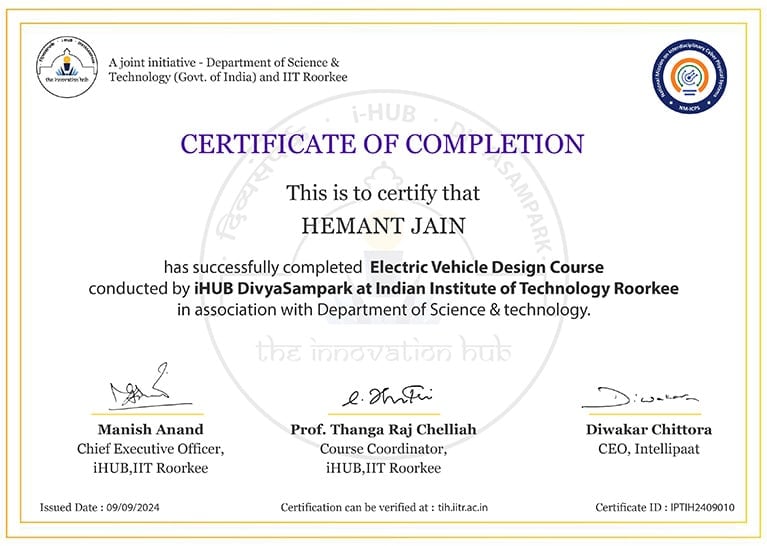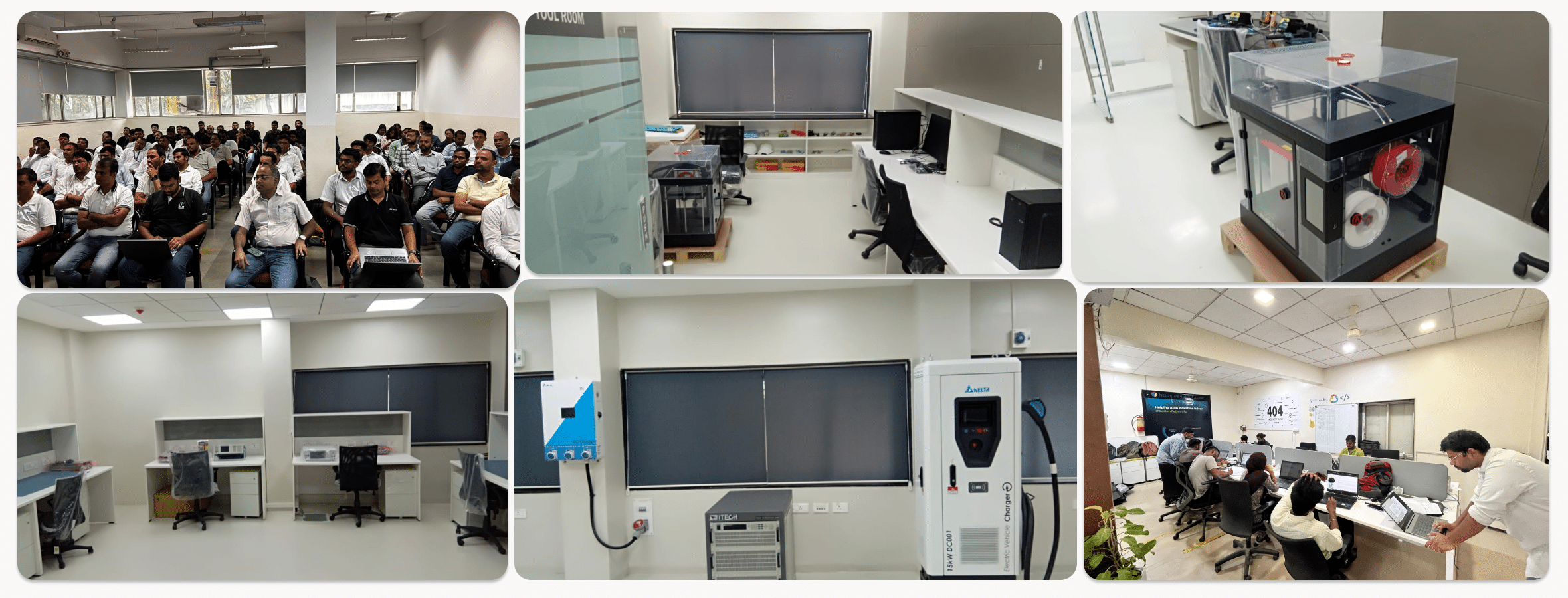Your cart is currently empty.






Electric Vehicle Course


Watch
Course PreviewElectric vehicles are the future of automobiles. Get started with your career into the promising domain of electric vehicle with this government certified program by NSDC & ASDC, Government of India. You will master EV architecture, battery technology, motor design, powertrain, understand autonomous vehicles and more. Get 24/7 Support & Soft skills training with placement assistance.
This Electric Vehicle Course offered by Intellipaat in collaboration with iHUB, IIT Roorkee, you will master 10 comprehensive modules, work on real-world projects, and gain hands-on experience IIT Roorkee campus.
Online Instructor-led Interactive Sessions:
Course 1: MATLAB Coding and Simulink Fundamentals
Course 2: Vehicle fundamentals and components of ICE Powertrain
Course 3: Voltage Control
Course 4: Battery Swapping and Basics of EV Charging
Course 5: Modeling for SMD System
Course 6: Battery Fundamentals and modelling BMS
Course 7: Charging Station components and building Fast Chargers
Course 8: Kinematics and Control of Autonomous Vehicles
Course 9: Physics and Mechanics for EV
Course 10: Electromagnetic Energy and Signal Processing
Additionally, this program includes a Capstone Project on Electric Vehicle Design and multiple hands-on workshops to enhance your expertise in EV architecture, battery systems, powertrain design, and charging infrastructure.
The key skills you will master in this EV course are:
EV dynamics, Battery management analysis, MATLAB and Simulink simulations, EV charging infrastructure, important concepts related to safety in EV, Autonomous vehicles and EV design.
Electric vehicles are the next big thing in the automotive industry. From global automobile majors like General Motors, BMW, Volkswagen, and Mercedes Benz to Indian giants like Tata Motors, Mahindra, and Maruti Suzuki, everybody is building innovate Electric vehicles.
The entry-level salary for an EV engineer in India is anywhere between ₹6-8 lakhs per annum, while experienced professionals in specialized roles can earn upwards of ₹15 lakhs per annum.
After completing this electric vehicle training in India, you will be able to work in various exciting roles like EV Designer, Electric Powertrain Engineer, Battery Engineer, Charging Infrastructure Specialist, or even EV design consultant. Top automobile players like Tata Motors, Mercedes Benz, General Motors, Renault and Nissan are already actively hiring electric vehicle designers.
This electric vehicle course is designed in consultation with EV industry veterans and subject matter experts. This course offers you 24/7 support and comes with a lot of practical exercises that will help you master top EV skills. You will learn from IIT Faculty & Industry experts and apply the gained knowledge in doing company-oriented capstone projects.
You will also work on software simulations packages for gain practical exposure.
Our Offline workshops will help you work on real life projects, and give practical exposure on component assembly, battery systems, Sensors Integration, sensor analysis, charging technologies, and lot more.
By completing this EV training, you will be ready for a successful career in the EV industry.
Talk To Us
We are happy to help you 24/7
60% Average Salary Hike
$1,30,000 Highest Salary
11000+ Career Transitions
300+ Hiring Partners
Career Transition Handbook
*Past record is no guarantee of future job prospects
They work on various chemical compositions to improve battery output, efficiency and safety.
They develop algorithms for battery management systems and IoT modules that deliver real-time EV operational data.
They work on motors and batteries to ensure they are within optimal thermal and operational ranges.
They ensure the driver circuits, wiring systems and data transfer mechanisms are always fine-tuned.
They focus on performance and improving the electric drive system.
Creates & plan the necessary infrastructure for charging and collaborate with governments and other stakeholders.
Vehicle Fundamentals
Battery Technology
Battery Sizing
Battery Management System (BMS) Development
MATLAB Simulink
Mechanical sub-systems
Charging Infrastructure
Low-voltage Systems
Testing of EVs
MATLAB Programming
MATLAB Plotting Functions
Debugging Tools
MATLAB ODE Function
Simulink Library Browser
MATLAB for EV Simulation
EMI Starts at
₹5,899
We partnered with financing companies to provide very competitive finance options at 0% interest rate
Financing Partners
![]()
Contact Us
Electric Vehicle Projects
iHUB DivyaSampark at IIT Roorkee was created under the National Mission on Interdisciplinary Cyber-Physical Systems. The Department of Science and Technology supports this initiative.
The Automotive Skills Development Council (ASDC) aims to improve the skills of India’s automotive workers. They focus on ongoing development, re-skilling, and up-skilling programs. ASDC focuses on aligning the workforce’s skills with the evolving demands of Industry 4.0, including robotics and electric vehicles.
The National Skill Development Corporation (NSDC) aims to empower India’s youth through skill development under a Public-Private Partnership (PPP) model. The NSDC mission focuses on skilling, reskilling, and upskilling 25 million individuals, including 15 million from disadvantaged socio-economic groups, and operationalizing 50,000 skills centres.
Upon successful completion of the program, you will receive the following certifications:
Get Industry recognized certification from iHUB, IIT Roorkee
Get Government approved ASDC certification
Get Government approved NSDC certification
On the successful completion of these electric vehicle training courses, along with the given projects and assignments, and scoring a minimum of 60 percent in the certification examination, you will be rewarded with the advanced certification in Electric Vehicle Design by iHUB, IIT Roorkee and Intellipaat.
Get hands-on experience with real EV components through an offline workshop focused on industry-aligned projects.
Our Alumni are working in Top EV Companies

You will learn MATLAB, Simulink and other simulation software’s to practise the exercises.
This training equips you with critical skills in EV system design, battery management, and charging infrastructure. You’ll gain practical experience in simulation and modelling, and insights into advanced technologies. These qualifications enhance your employability in the rapidly growing EV sector.
Electric Vehicle Design involves building and creating vehicle using electricity instead of traditional fuel engines. In this you will work upon design analysis, battery heat management, safety principles, & more.
The EV Industry has huge job prospects. Experts believe the shift from regular cars to electric vehicles will greatly change the automotive industry by 2025. By 2025, electric vehicles will have risen from 3% to 23% of the worldwide market.
The Electric Vehicle Design Course incorporates mechanical and automotive engineering principles by focusing on designing, optimizing, and integrating various vehicle subsystems. Engineers apply mechanical engineering concepts to understand and develop components like the steering, suspension, and thermal management systems.
Automotive engineering principles are used to address aspects such as vehicle dynamics, powertrain design, and overall vehicle performance. This approach helps students understand both fields related to electric vehicle development.
Leading automotive industry manufacturers like Daimler, TATA Motors, Mahindra, Hero, Tesla, Rivian, and others are hiring EV designers. Even multiple tech companies like Google and Apple are building software’s and utilities for the EV cars and are hiring at multiple levels.
No, it is possible to start a career in electric vehicle design without a degree.
Yes, we provide interview mocks during this as it helps in practicing the real interview scenarios. It will boost your confidence and increase your chances of successful.
Yes, Intellipaat provides practice exams for these Electric Vehicle engineering courses. As it will help you enhance your subject knowledge and prepare for the exams.
The process for getting into the placement pool is:
Intellipaat offers query resolution, and you can raise a ticket with the dedicated support team at any time. You can avail yourself of email support for all your queries. We can also arrange one-on-one sessions with our support team If your query does not get resolved through email. However, 1:1 session support is given for 6 months from the start date of your course.
Intellipaat will help you land into your dream EV company. This course will help you become ready to crack EV company interviews. Our placement services will help in mock interview preparation, soft skills enhancement, and helping you connecting with top EV employers
Our Offline workshop will provide you practical hands-on exposure and technical expertise to clear the interviews.
In this course will be arrange webinars from top EV Veteran who are the CXO of top EV companies and they will share knowledge on latest trends in the EV Industry. Also, if anyone wants to start their startup in EV domain, we will help them in pitching their ideas to investors.
IIT Faculty will take the following modules:
No, our job assistance is aimed at helping you land your dream job. It offers a potential opportunity for you to explore various competitive openings in the corporate world and find a well-paid job, matching your profile. The final hiring decision will always be based on your performance in the interview and the requirements of the recruiter.
Yes, we provide physical labs for electric vehicles.
Yes, this program is completely aligned with the future of the electric vehicle automotive industry.
Offline physical workshops will be scheduled at the end of the program. Interested participants must make an additional payment of ₹20,000 (inclusive of GST) to attend the workshop.
All candidates applying for this course are eligible for equity-based seed funding and incubation support from iHUB DivyaSampark, IIT Roorkee, for their startup ideas. Enrolled students will have the opportunity to pitch their ideas to the iHUB DivyaSampark team, and shortlisted proposals may receive funding of up to ₹50 lakh, along with full incubation support.
Additionally, candidates who are currently enrolled in a degree program and have their startup idea approved may also receive a monthly fellowship/scholarship of ₹8,000 during the early phase of their project to encourage and support innovation.




 Click to Zoom
Click to Zoom
